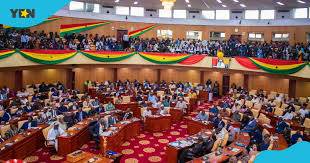Drama In Parliament As NDC, NPP Caucuses Occupy Majority Side Of The House
The Parliament of Ghana witnessed intense drama when both the National Democratic Congress (NDC) and New Patriotic Party (NPP) caucuses clashed over who should occupy the Majority side of the House. This unprecedented situation unfolded on the first day of the 8th Parliament on January 7, 2021, following the 2020 general elections, which left Ghana's Parliament without a clear majority for either party.
In the 2020 elections, both the NDC and the NPP secured 137 parliamentary seats each, with one independent candidate, Andrew Asiamah Amoako, holding the deciding seat. His decision to align with the NPP gave the ruling party a numerical edge, but the NDC refused to recognize the NPP’s claim to the Majority side, citing that it was not constitutionally clear which party held a definitive majority.
As Parliament convened to elect a Speaker, chaos ensued as MPs from both sides tried to assert their dominance. The NDC caucus, arriving early, seated themselves on the Majority side, typically reserved for the ruling party, which sparked tensions with the NPP MPs who arrived later. The NPP, claiming the Majority position, demanded that the NDC MPs vacate the seats. However, the NDC MPs, led by their leaders, refused to comply.
The ensuing standoff led to heated exchanges, shoving, and, at one point, the intervention of security personnel to restore calm. The situation became so chaotic that the electoral process for the Speaker of Parliament had to be temporarily halted. The tension in the chamber reflected the larger political uncertainty created by the evenly split Parliament.
Eventually, after hours of impasse and verbal confrontations, the situation deescalated, but not without setting the tone for a highly charged parliamentary session. Alban Bagbin, a member of the NDC, was controversially elected Speaker of Parliament, marking the first time a member from the opposition party assumed the role under a sitting president from a different political party.
This dramatic event underscored the deep divisions in Ghana’s 8th Parliament and foreshadowed a future of contentious debates and political maneuvering. The standoff over which party should occupy the Majority side illustrated the delicate balance of power and the evolving nature of Ghana’s parliamentary democracy.



No comments yet
Be the first to share your thoughts!